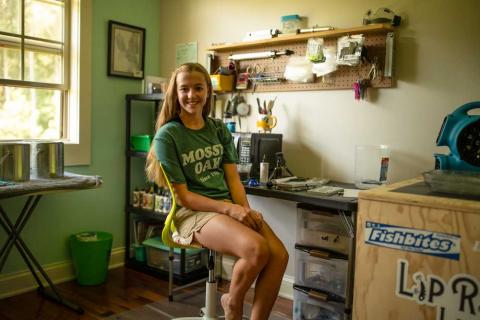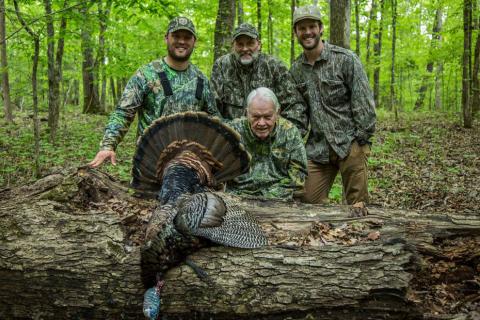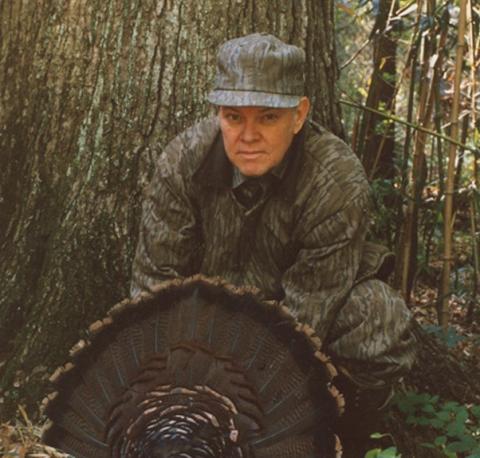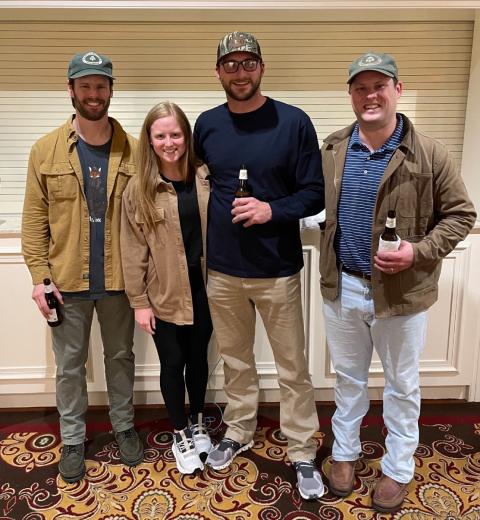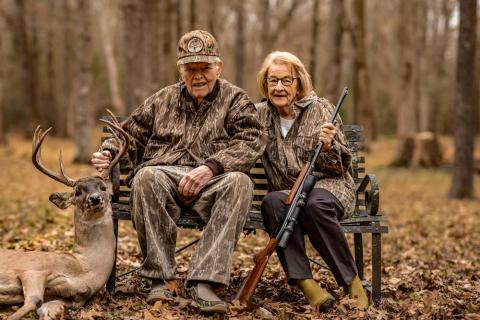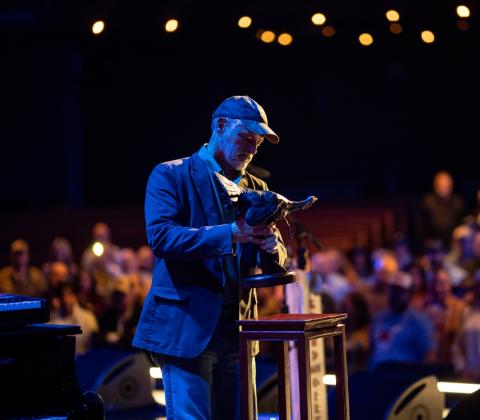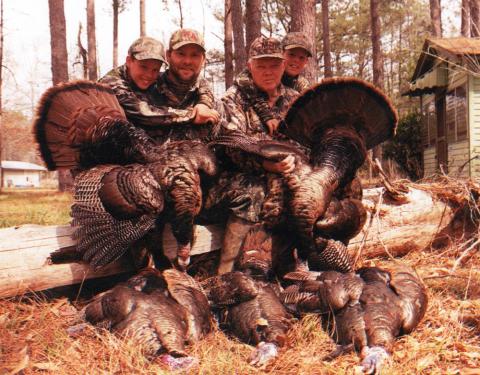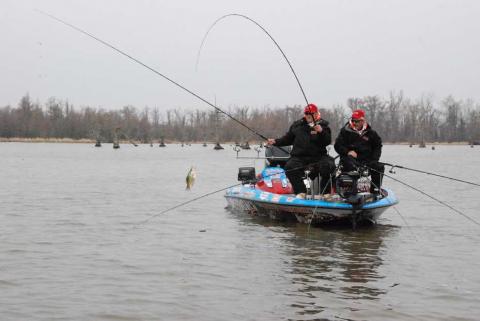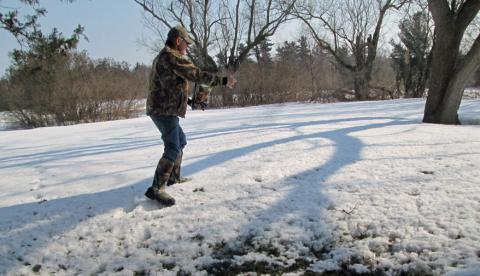provided by John E. Phillips
Many bass fishermen dream of one day becoming pro anglers. They may believe that when they reach that level of bass fishing, all they’ll have to do is travel the nation pulling their bass boats behind them stocked with rods, reels and tackle and pulled by a pick-up truck that looks like a fishing-tackle store packed with many colors of different lures. But there’s another side of professional bass fishing that often goes unknown. Ott DeFoe has earned more than $2.5 million bass fishing and shares about the real world of a professional bass fisherman.
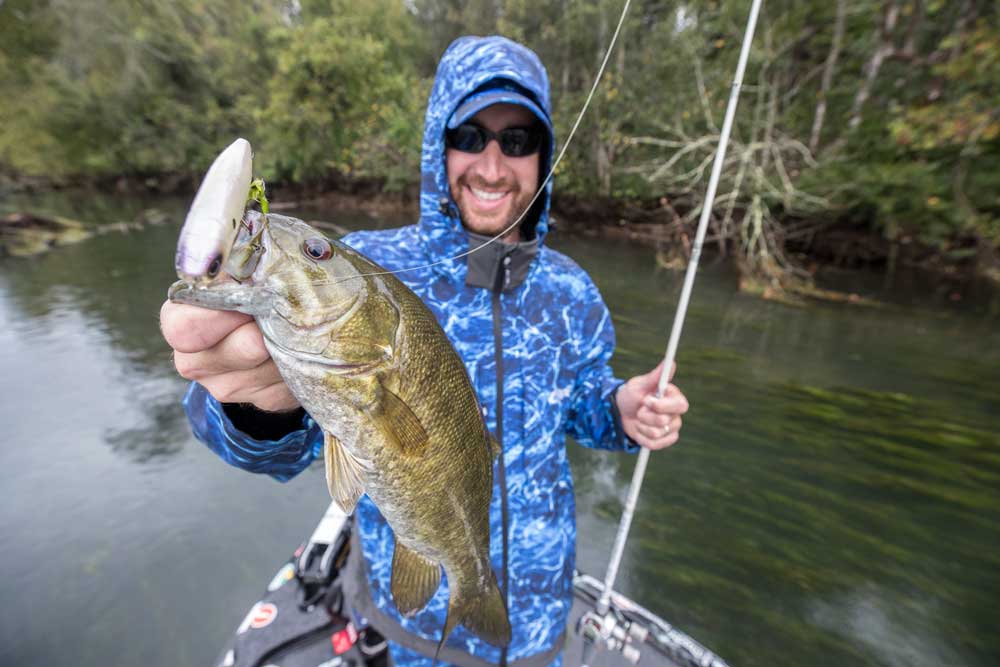
The Business Side of Professional Bassing
Phillips: Ott, what is the business side of being a professional fisherman, and who manages that for you? How do you learn the business of being a professional angler?
DeFoe: I learned the business side of becoming a professional angler mainly by trial and error. Most newcomers to our sport don’t understand that a professional angler is primarily a promoter. You fish tournaments to represent your sponsors and the brands of products they produce. The tournaments we fish and how we perform in those tournaments gives us a platform to speak to other anglers about the products we use, why we use them, and how those products help us to be successful. The TV coverage we get, as well as livestreaming, social media and the print media and how we relate to all those media outlets is a very critical part of the business of being a professional angler. Often we become the faces of the companies that sponsor us. We show the new products that the companies produce every year, as well as their goods and services, and we demonstrate how effective they can be to find and catch bass.
Phillips: How much of your time is spent fishing, and how much of your time is spent promoting?
DeFoe: I would say it’s about 50/50 because our tournament days are 8 hours on the water. But the good part about this 50/50 split is when I’m fishing I’m promoting, and when I’m promoting, I’m often fishing. Each side of the business of being a professional fisherman works together.
Phillips: When you’re fishing a six-day tournament with a first-place prize of $100,000, you’ve got to have your mind totally on finding and catching fish. When you’re promoting for your sponsors, you may be conducting seminars, making videos for social media, television and commercials and/or working and speaking at consumer shows. Who keeps up with your sponsor responsibilities when you’re fishing, and who keeps up with your fishing responsibilities when you’re working with your sponsors? Who finds places for you to stay and eat when you’re fishing tournaments and helps with all the other little details that are required for you to be as effective as you can be as a bass fisherman?
DeFoe: The social-media responsibilities and the contract responsibilities that I have for my sponsors all fall on my wife Jennie’s shoulders. She makes sure I get to where I’m supposed to be and tells me what I’m doing. She checks all the boxes to make sure I’m doing all the things I should be doing for all the people with whom I’ve agreed to work. Besides that, she handles all my hotel reservations and the details that go into making sure I get from one place to the next place on time, and that I’m ready to do what I should do. Really, Jennie is the front end and the back end of the Ott DeFoe fishing business. I’m the small piece in the middle of that business.
Most of the professional fishermen are either married or have a significant other who helps them handle the business side of being a professional angler. If you know anything at all about professional bass fishermen, you know that we’re really good at catching bass but probably not so good at all of the rest of the business side of being a professional fisherman. Studying where to find a bass, and what to catch it on, and what’s the business side of being a professional fisherman are the two things that are always in the minds of pro bass fishermen. We don’t have a lot of time for anything else to be on our minds.
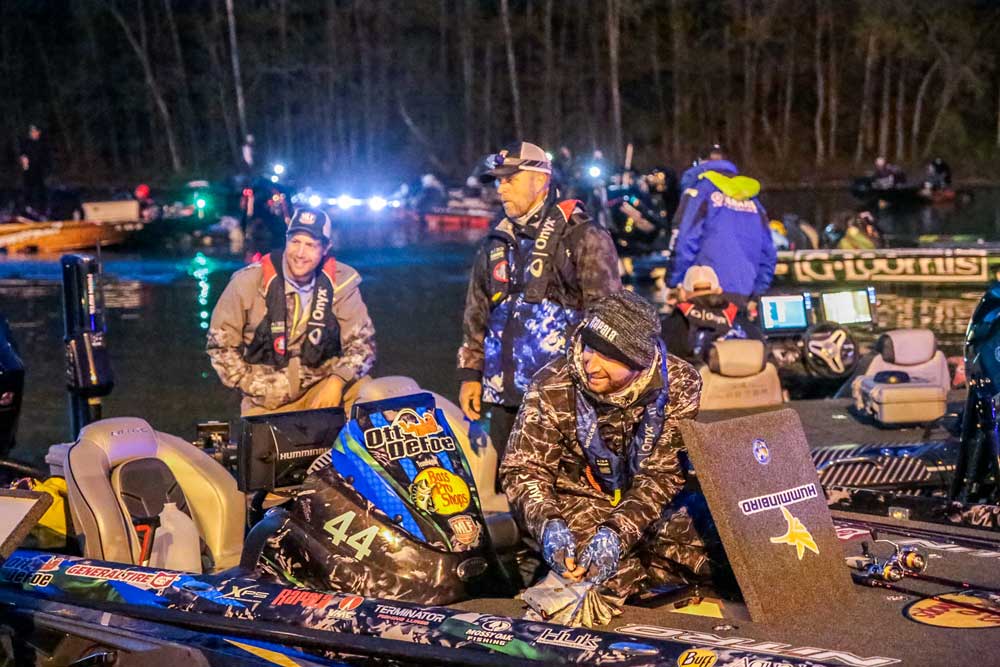
Phillips: How far in advance will your wife Jennie start setting up the plans for where you’ll stay, where you’ll eat, and how you’ll get to tournament sites each tournament season?
DeFoe: Jennie will start booking the places where I’ll stay the first day our tournament schedule is released for the next season – probably within 48 hours. She not only reserves my rooms, but also makes sure that the hotel or the motel has electrical outlets to enable me to charge all the electronics on my boat every night when I come in from practice or competition days. She makes sure that the place where I’m staying is close to the tournament site, and that it’s in a safe area. Although we go to some new lakes every now and then, she tries to book at places where I’ve stayed before. At most tournament sites, we prefer to rent a house to stay in rather than staying in a hotel or a motel. She hopes to find a house that’s reasonably close to the lake we’ll be fishing. I room with Andy Montgomery, who’s another tournament angler.
We have more space for our equipment and places to work on our equipment in a house than in a hotel or a motel room. We try to get a two-bedroom house to give us some more space to stretch out than we’ll have in a hotel or a motel room. We always make sure the house we stay in has room to park two boats and two trucks and offers all the electrical outlets and plugs where we can recharge our electronics in our boats.
Phillips: When you stay in a house, do you cook for yourselves, or do you eat out?
DeFoe: We typically eat out but not that we can’t cook. However, once we come off the water after a hard day, physically and mentally, of fishing, we usually want to eat quickly, get back to our room, prepare our tackle for the next day’s fishing, shower and go to sleep. We don’t really feel much like cooking or especially washing dishes.
How Pro Anglers Spend Their Time after a Tournament Day
Phillips: What’s your routine for preparing your equipment for the next day of practice or competition?
DeFoe: On practice days, we don’t spend a lot of time preparing our equipment, but on tournament days, we spend much more time getting ready for the next day.
There’s always a few rods on which I’ll need to put new line. Any lure that I’ve used during that day, I’ll tie a new knot on that lure if I plan to use it the next day. I’ll sharpen any hooks that may need to be sharpened on my lures and then possibly dig through my equipment locker in my truck for any other lures I may need to fish with the next day of the tournament. I’ll also go over my lake map to see where I’ll start fishing the next day and the schedule of stops where I may plan to fish.
Most days I can have all my preparation work for the next day of fishing completed in an hour after supper. If I have to completely go through all my tackle and put line on several rods, I may spend 2 hours. The prep work for the first day of the tournament is always at least a 2-hour job because I’ll have several rods that need new line on them. If I’m fishing a specific crankbait and catching a lot of bass on it, I want to make sure I’ve got at least four crankbaits of that size and color in my tacklebox for the next day of fishing.
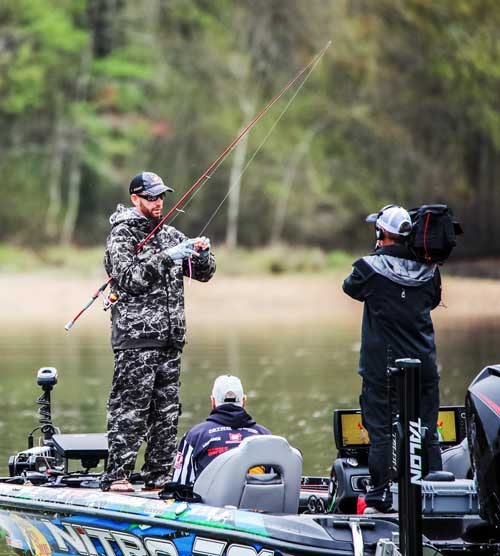
Phillips: Do you do any social-media work or work with your sponsors at night when you come in from fishing?
DeFoe: Oh yeah. I’ve always got something going on with social media after every day of practice or competition. And, you hope you have interviews with the press because that means you’ve had a good day of fishing. Part of the business side of being a professional angler is talking to the media and letting them know how you’ve fished and what baits or lures have been the most productive for you that day.
Phillips: After all your prep work and social-media work, what time do you usually get to bed on a practice or a tournament day?
DeFoe: I try to be in bed by 10 or 10:30 during tournaments. I’ve found that getting plenty of rest for the next day of fishing is very important. I’d rather leave a little something undone, if I have to, to make sure I get to bed on time. I believe that a fisherman’s rest is more important than having everything perfect for the next day of fishing at the expense of not getting the rest you need to be physically and mentally prepared for the next tournament day.
Phillips: What time do you usually get up to fish an event?
DeFoe: The last two tournaments I’ve fished, the takeoff time has been either 8 or 8:30 a.m. I’ll usually get up at about 6:30 a.m. to be prepared for an 8 o’clock takeoff. We don’t always start fishing at daylight.
Phillips: What was the worst turnaround day you’ve ever had?
DeFoe: A couple of years ago, during the first five days of a tournament, my fishing time was from noon until 8 p.m. On the fifth day, the takeoff time was at 6 a.m. For some reason, officials made the final day of the tournament from 6:30 a.m. to 2:30 p.m. So, that was a very late evening to a very early morning turnaround. I got in bed at 11 p.m. and got up at 5 a.m. Another factor that made that turnaround so bad was because I started fishing at noon and fished till 8 p.m., I was fishing in the hottest part of the day.
How to Conduct Business
Phillips: We’ve talked about the fishing side of the business, but while you’re fishing a tournament, there are still numbers of responsibilities that have to be taken care of on the business side of being a professional angler. Who handles the phone traffic between sponsors, media and fans while you’re on the water?
DeFoe: During events, most of my communications are emails, especially with our sponsors. They don’t want to interfere or take-up any of our time when we’re at a tournament site. If they call or text, I’ll take care of that communication. However, most of the time they email my wife Jennie, and she deals with anything that comes up. If it’s an issue that’s time sensitive, and I get a text from a sponsor, I’ll usually take care of those as soon as I get off the water.
Jennie knows almost all my sponsors as well, if not better, than I do. They’ve learned that if there’s anything that needs to be done, they can count on Jennie more than they can count on me. If they ask Jennie to do something or to get me to do something they need, they know Jennie will make sure it happens. They also know that if they ask me to get something done, it may happen.
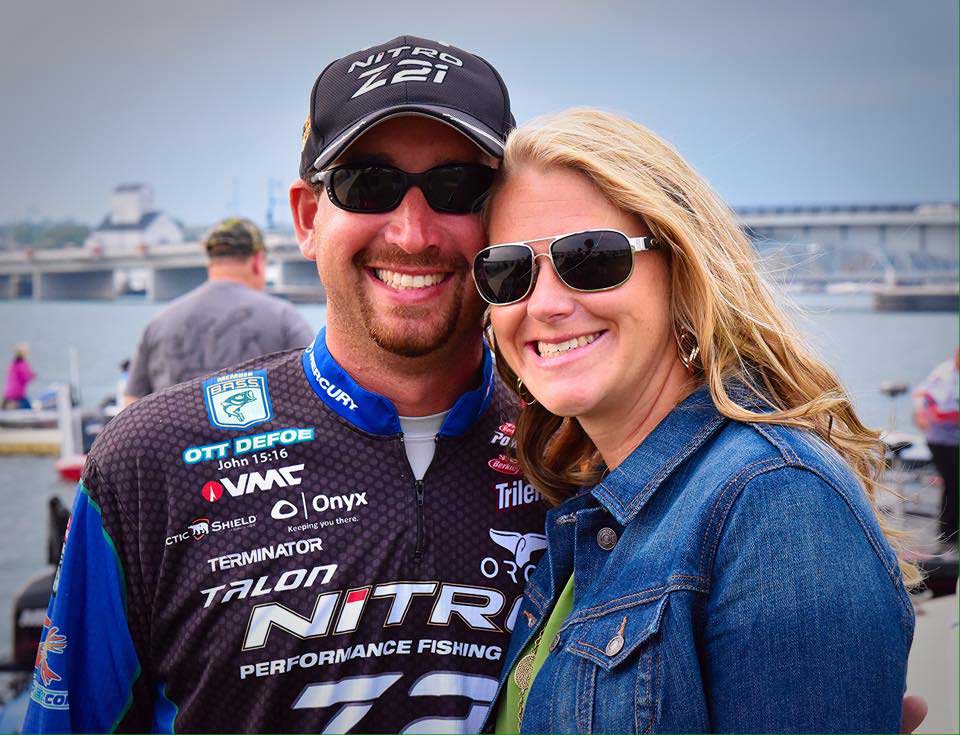
Phillips: When the tournament’s over, you don’t get a check for your winnings at the event, do you?
DeFoe: No, my winnings are always direct deposited into my bank account. My wife Jennie handles everything to do with the amount of money that comes in, the amount of money that goes out and getting everything paid on time. Pretty much all I do is fish for bass, and take a picture or shoot a video for my social media every now and then.
I think Jennie has more than two jobs. I think she has at least four or five when you’re talking about her taking care of my fishing business, the house and the kids.
Phillips: And how old are your children?
DeFoe: Abby is 14, and our twins are 10. If there’s a leak in the roof, Jennie gets it repaired. If the hot-water heater goes out, and we have to get a new one and have it installed, Jennie takes care of that. I don’t ever have to do much about any of those kinds of problems, but I do hear about them. Jennie takes care of all the financial responsibilities that I have, our family has, and our house needs. I haven’t written a check in years and years.
To fill all the roles that Jennie fills, I’d probably have to pay someone $50,000 to $100,000 a year, but that’s really if I could find somebody to do just most of what she does - not accounting for childcare. And, I might have to have two people to take care of all the business side of fishing that Jennie does for me.
Phillips: When you became a professional fisherman, you knew how to find and catch bass. How did you learn the business side of being a professional fisherman?
DeFoe: I found someone who worked with a large fishing-tackle company who managed its pro staff, and I developed a relationship with her. I was new in the sport, and this lady offered to help me. She gave me a lot of guidance, based on the experiences she’d had with many pro anglers over many years. She knew the things that would work in the business of being a professional angler, and what wouldn’t work. Other professionals in the fishing-tackle industry helped me learn this business along the way, too. I also had tournament anglers I knew and trusted, and they helped to try to steer me in the right direction to learn this business. There’s really no manual you can read or a video you can watch that can teach you how to run the business side of being a professional angler. There’s a lot of right ways to do things and just as many wrong ways. Making friends you trust, listening to their advice and deciding what works best for you is, I believe, the best way to learn the fishing business.
What to Do When Problems Occur
Phillips: You have a certain routine that you go through when you’re going to a tournament site, and when you’re fishing. You also have a routine you go through when you’re home with your family. What happens when you have a breakdown with your vehicle in-between those two places? You’re sitting on the side of the road, and you know you’re supposed to be somewhere at a specific time, but your vehicle won’t go?
DeFoe: If I have a flat tire, I have tools in my truck to solve that problem. I usually can be back on the road within 20 or 30 minutes if I have that type of breakdown. However, I have had my truck quit on me a couple of times on the way to tournaments. One time I wasn’t far from the tournament I was trying to get to, and my brother and dad were already at the tournament site. So, they came back, picked me and my boat up, took me there and then made sure my truck made it to a repair site to be repaired while I was fishing. Another time I had a breakdown, my dad came and brought me his truck, and I was able to get to the tournament while dad got my truck fixed. But I have known pro anglers whose trucks have broken down well away from home, and they’ve called a U-Haul company, rented trucks, and called wreckers to tow their trucks. Then they used the U-Haul trucks with all their gear stored in them to fish the tournament, while their trucks were being repaired. But you’ve got to prepare for those types of problems, because they more than likely will happen sometime in your professional fishing career.
How to Become a Professional Bass Angler
Phillips: Right now, there’s a number of collegiate and high school bass fishermen who are dreaming, hoping and working to try to reach the next level of professional fishing. What advice will you give them?
DeFoe: The question I’m most often asked by a lot of high school and college competitive anglers, is, “How do you get sponsors?” And I think that’s really the wrong question to be asking. When I started my bass-fishing career, getting sponsors was not my number-one priority. My goal was to be the best bass fisherman I could be. I wanted to do well in competitions, and I wanted to have sponsors at some point in my career, but my primary goal was to be the best competitive angler I could be. I wanted to win events, I wanted to earn checks, and I wanted to win championships. I believed that if I could be the best competition bass fisherman possible, then the sponsorships would catch up to me.
Sponsorship isn’t very significant when you’re just starting out. A tournament bass fisherman has to prove he can catch bass, promote products and has value for a manufacturer or a company in the fishing industry. You’ve got to be successful before you’ll attract sponsors. I didn’t have a big boat, a new truck or fancy rods and reels when I started off as a professional angler. Most of my rods were 10-15 years old. I had a very limited assortment of lures. And, I carried a plug knocker with me to try to get every one of my lures unhung and back in the boat when it would get hung-up.
I’d tell those young anglers to be concerned about their fishing and try to do the best they can in every tournament they fish. Try to have high finishes in every tournament. If you take care of that, the sponsorship and the rest of the business of being a professional fishermen will fall into place.
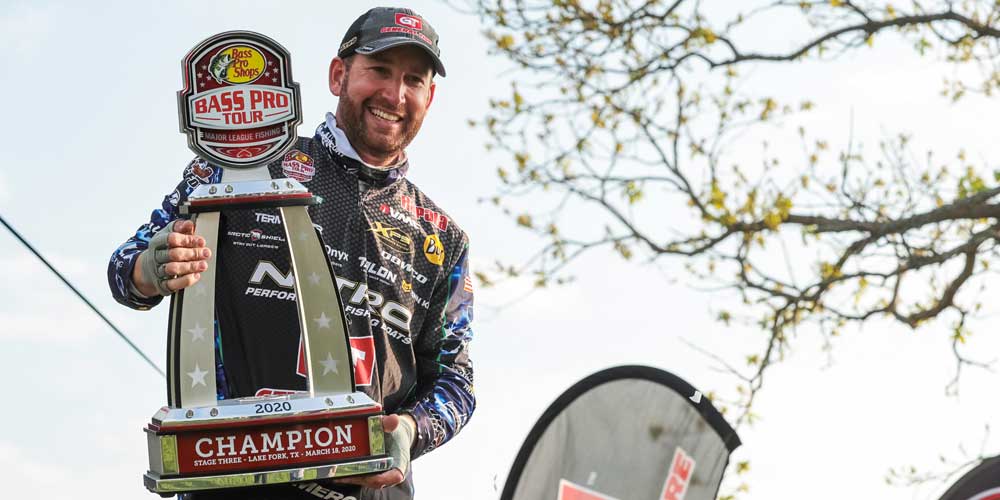
Phillips: How has professional bass fishing changed since you got into the sport 15 years ago?
DeFoe: Social media wasn’t even around back then, but now social media plays a critical role in a professional fisherman’s ability to move up the ladder in the sport. Building your fan base and the people who want to know how you find and catch bass through social media is a major part of our jobs now. Also the way you handle yourself, and how you treat your fans and the public is important. You’ve got to be very professional, look professional, speak professionally and be viewed by the public as somebody they want to learn from and get to know.
Phillips: Ott, what would you tell a young person who’s trying to come into the competitive fishing business about how to handle his fishing, the business, his family, his girlfriend or wife, sponsors and the time commitment to each one of those entities to become a success as a professional angler?
DeFoe: That’s really the toughest side of being a professional fisherman. Many people will want to spend time with you, and probably you need to spend time with them. So, you’ve got to get your priorities straight, if you’re going to make this business a success. My priorities are number one: God. I feel like, if you keep Him first, everything else will fall in line. My family is number two, behind God. And, fishing is third, because as much as I love fishing, and as much as I realize I’m very, very fortunate to make a living as a fisherman, it’s still a job. Fishing is not everything that Ott DeFoe is about.
Phillips: What advice would you give a potential bass fisherman on learning the business of being a professional bass fisherman?
DeFoe: My wife Jennie is a list maker, and she loves to check off the things she’s gotten done each day on that list. Now, making lists sounds like a very simple thing to do, but it allows Jennie to get everything organized about my fishing business, the family and our finances. So, every day, she knows what she has to accomplish for me to be totally focused on fishing when I’m in a tournament, take care of all the responsibilities of our fishing business, tend to the needs of our family and meet our financial responsibilities. That’s the process she uses to manage my business. She also sets up a timetable of when everything needs to be done. As I’ve mentioned earlier, she sets up where I’ll stay at a tournament, gives me choices of places to eat, pays entry fees and has my travel schedule set up within the first 48 hours after we get the next year’s tournament schedule.
Phillips: Do you think most of the seasoned, successful pro bass fishermen will be willing to give advice on the business of fishing to young pros who are just coming in to the professional bass- fishing business?
DeFoe: Yes, I do. When I first came into this business, respected anglers I looked up to and came to be friends with were more than happy to help me know what to do and how to do it. I think when the new class of competitive fishermen comes to some of the major fishing circuits, the older guys will give them honest answers to their questions and good advice from their experiences. For me, to be the best bass fisherman I can be and to perform at my highest level of proficiency when I’m on the water casting and winding, pre-fishing or competing in a tournament, the rest of the world doesn’t exist. I have to be totally focused on finding and catching the most or the biggest bass I can catch.
During the day I have to fish, and after I come off the water, I have to eat supper, prepare my equipment for the next day of competition, catch up with my social-media responsibilities and make sure I’m rested and ready to fish for the next day. To accomplish these goals, I have to have someone else (Jennie) taking care of all my other responsibilities. And this is one aspect of the business that many young anglers are not aware of, since a professional fisherman has numerous responsibilities with sponsors, the media, finances and family. If he doesn’t have someone else taking care of those responsibilities, he can’t fish as worry-free as he needs to be successful. When I’m on the water fishing, my only thought is, “Where am I going to catch the next bass?” Jennie and I are not only husband and wife, we’re partners in the fishing business.

















